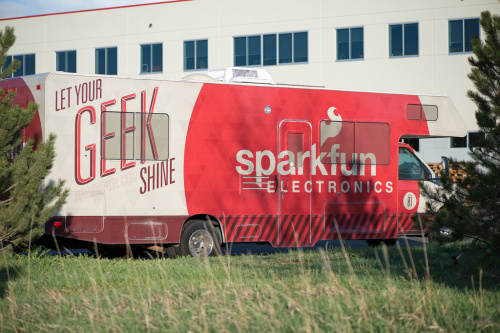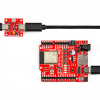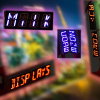"SparkFun is Radioshack for the Maker Crowd"
Thus reads the headline for Fast Company writer Rob Walker's recent piece about SparkFun. We were first put in touch with Rob back in October, when he contacted us with an interest in doing a piece about SparkFun.
_Photo via Benjamin Rasmussen, Fast Company_
Rob interviewed several people from SparkFun -- most notably our CEO Nate Seidle (pictured above working on a SparkFun Inventor's Kit) and our Creative Technologist Nick Poole (of product demo fame).
We weren't entirely sure what the article Rob was working on would say -- like any good journalist, Rob plays his cards close to his chest and we really had no idea in what direction the article would ultimately head.
So yesterday, we finally saw the article that had been months in the making -- it's a really cool piece and it's awesome to see SparkFun in a publication like Fast Company.
So what do you think about the comparison? Is SparkFun the RadioShack for Makers (hopefully without all that messy bankruptcy business?
We certainly want to be the go-to source for the stuff you need to complete your projects. We work hard to keep our finger on the pulse of the DIY community and get the coolest products around. Maybe SparkFun is the RadioShack for Makers...just hopefully the RadioShack from circa 1982 and not the current one with a -$350 million dollar operating income.
Thanks to Rob for the awesome writeup!








Please don't start selling cell phones....
They kind-of do
https://www.sparkfun.com/products/9427
https://www.sparkfun.com/products/13186
Build your own cell phone, ftw!
Don't forget the old Port-O-Rotary
That link makes me sad because I REALLY wanted one...
Makers have been around for a long time. Fueled by Government surplus from WWW2 and Korea. This movement spawned HeathKit, Eico, RadioShack, and other long gone companies. In the 50s, folks were using point-to-point wiring and vacuum tubes, and parts made in the USA. I built my first radio transmitter out of parts scavenged from an old B&W TV. (5U4 for Power supply, 6L6 for Amplifier).
Some years later, the Z-80 and the S-100 bus gave the movement another jolt, with CP/M being the top software. This was followed by IBM PC and its clones, and Microsoft.
Integrated circuits, offshore electronic manufacturing, and throw-away thinking slowed the movement, but now it's come back. I don't know how long it can last, we're in for surface mount, fewer nanometers and whole systems on a single IC, encapsulated in plastic, with nothing to solder onto.
Just a rambling from this old-timer.
I think Radio Shack was the Radio Shack for makers... It seems like the media is acting like the maker movement is some big new thing when really it is just more visible now. The reason why Radio Shack was successful for its early years was these yet to be defined "makers" of the day. All those people who made radios from Radio Shack kits in the early Radio Shack days would fall into the current definition of "makers." All the home "DIY" and "maker" projects involving home improvements used to just be called "taking care of your house" or inventing.
The difference now is the level of technology available to the masses has increased along with the ease of sharing your projects. This has led to a more impressive/visible footprint for a maker movement, but I think what is being called the maker movement is just the term of the day for standard human ingenuity/creativeness that has always been there.
I miss HeathKit.
A couple of big differences from my point of view - with Sparkfun I have to pay shipping and have to wait a few days for the part to arrive. At Radio Shack I had it in my hand and there was no shipping shock added to the price. Even with their inflated prices, for small generic items the overall price was lower and I had it right away.
Please note, I'm not hating, complaining or blaming. They're 2 different business models. I just wish that there was still a place where I could walk in and buy an LED without paying 10 times as much for shipping that would let me have it when I needed it.
For things that I can wait for to arrive by cheap (slooow) mail, and for those special items that no one else has, SF definitely has it over RS (especially since they're still in business).
I agree, it is nice to have a local place to buy things. I would love to be able to teleport things to your hand, but we're still working on that technology. Until then check your area and see what electronics parts stores are around. Independent stores do still exist, they often take a bit of hunting to find though.
Comparison between SFE and RS is a good and bad thing.
Good: Means you're the first place people think to get products from to fit their projects, and RS was like that back in the days of its glory.
Bad: When RS died, it had very little selection on "maker" features and really tailored itself to selling cell phones, and RC vehicles.
My take on it is mixed. I see SFE doing a lot of good in education and providing the products to learn. As an example, when I was first building electronics in college (EE of course), SFE was my first stop since it had everything I needed and I didn't need to worry about getting parts from the department "shop," but as I grew more knowledgeable in EE and what I can do, I've been migrating away from SFE because it's cheaper to buy from a big distro like Digikey; plus, SFE isn't carrying the products I require/use on a frequent basis.
But to each their own.
Are we all considered "makers"? I would say Sparkfun now replaces RS, period.
The "maker" definition is certainly broad and a bit tough to nail down.
We don't actually throw around the word "maker" too often at SparkFun as a general descriptor of our customers, because what most people consider makers are just one subsection of our entire customer base. Truly, our customer base is hugely broad -- from design engineers at telecom giants, to homeschool mom's and dad's, to artists and "burners," to college professors, and, yes, "makers."
I'm not sure "makers" is inclusive or descriptive of all our customers, but it's a start. We like to cater to anyone and everyone who wants to get their hands on cool tech -- whether they are a maker, or a DIY enthusiast, or a teacher, or whoever. We're equal-opportunity enablers.